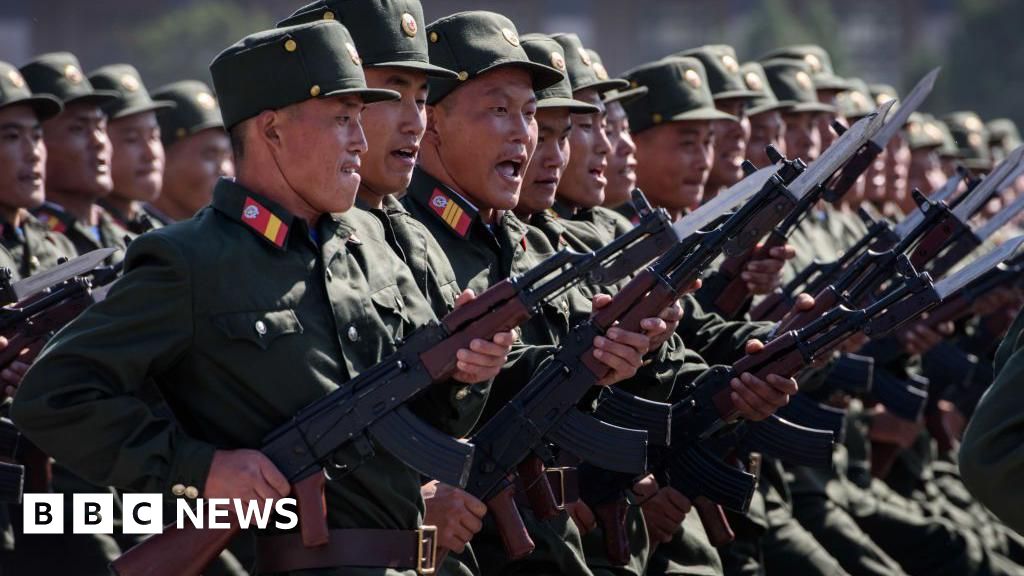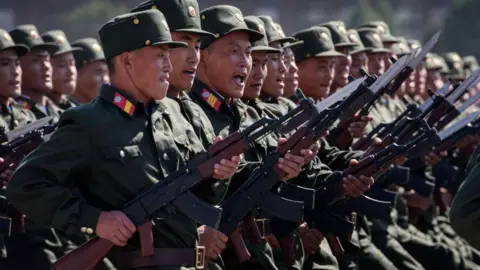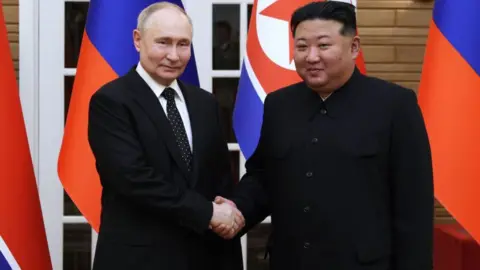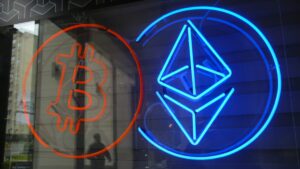
 Getty Images
Getty ImagesWhen rumours first emerged in October that North Korean troops were about to start supporting Russia’s war in Ukraine, it wasn’t immediately clear what role they would be fulfilling.
Their lack of battlefield experience was given as a key reason why they might just be assigned to non-combat roles.
But after the US and Ukraine revealed North Korean troops have already engaged in combat with Ukrainian soldiers, their role in the fight is being re-evaluated.
Even the number being deployed – originally put at around 11,000 by the Pentagon – has been debated. According to Bloomberg, unnamed sources believe Pyongyang may actually deploy as many as 100,000 troops.
Accurate information is difficult to come by, however, as Moscow and Pyongyang have not responded directly to any of these reports.
So what do we know about the presence of North Korean troops in Russia?
How effective are these troops?
In short, it is hard to say.
The secretive kingdom may have one of the world’s largest militaries, with 1.28 million active soldiers, but – unlike Russia’s military – the Korean People’s Army (KPA) has no recent experience of combat operations.
Mark Cancian, from the Centre for Strategic and International Studies (CSIS), believes Pyongyang’s army is “thoroughly indoctrinated but with low readiness”.
However, he says, they should not be presumed to be cannon fodder – adding such a characterisation is “Ukrainian bravado”.
Ukrainian and South Korean intelligence services have said that many of the troops deployed to Russia are some of Pyongyang’s best, drawn from the 11th Corps, also known as the Storm Corps – a unit trained in infiltration, infrastructure sabotage and assassinations.
These soldiers are “trained to withstand a high degree of physical pain and psychological torture”, says Michael Madden, a North Korea expert from the Stimson Center in Washington.
“What they lack in combat they make up for with what they can tolerate physically and mentally,” he adds.
Mr Cancian agrees that “if these are special operations forces, they will be much better prepared than the average North Korean unit”.
“Further, the Russians appear to be giving them additional training, likely on the special circumstances of the war in Ukraine,” he adds.
This appears to be backed up by the appearance of videos on social media showing men believed to be North Koreans in Russian uniforms, at what appear to be military training facilities in Russia.
And as the war in Ukraine creeps towards its third year, these North Korean troops may be among “the best capable” among the troops available to Russia, says Chun In-bum, a retired South Korean army lieutenant-general.
Moscow has been recruiting at least 20,000 new soldiers a month to help bolster its war effort, with more than 1,000 Russian soldiers killed or wounded on average daily, according to Nato and military officials in the West.
“[Russia] has been sending troops to the front without proper training. Compared to such recruits, North Koreans are trained and motivated. They are not combat-tested currently, but that soon will not be the case,” Lt-Gen (retd) Chun said.
Still, some experts believe the obvious language barrier and unfamiliarity with Russian systems would complicate any fighting roles, suggesting instead that Pyongyang’s troops would be tapped for their engineering and construction capabilities.
Why is North Korea getting involved?
Given these disadvantages, what is in this deal for the two countries?
Observers say Moscow needs manpower, while Pyongyang needs money and technology.
“For North Korea, [such deployments are] a good way to earn money,” says Andrei Lankov, director of the Korea Risk Group.
South Korean intelligence puts this at $2,000 (£1,585) per soldier per month, with most of this money expected to end up in the state’s coffers.
Pyongyang could also gain access to Russian military technology, which Moscow would otherwise have been reluctant to transfer, Mr Lankov adds.
 Getty Images
Getty ImagesMoscow’s manpower problems have been widely reported, with the US estimating that some 600,000 Russian troops have been killed or wounded since its invasion of Ukraine in 2022. In September, Russian President Vladimir Putin issued an order – for the third time since the war started – to expand his army.
It has also pursued personnel strategies that “minimise domestic political impact”, such as offering bonuses to recruits who volunteer and enlisting foreigners with the promise of citizenship, says Mr Cancian from CSIS.
“With Russia reportedly suffering over 1,000 casualties on the battlefield, reducing its own losses could alleviate some pressure on the Putin regime,” agrees Lami Kim, a professor of Security Studies at the Daniel K Inouye Asia-Pacific Center for Security Studies.
What does South Korea think?
These developments, coming at a time when tensions within the Korean peninsula have spiralled to their highest in years, are worrying Seoul.
In October, the North blew up sections of two roads that connected it to South Korea, days after accusing Seoul of flying drones into the North’s capital Pyongyang.
That came after the two countries engaged in a tit-for-tat balloon campaign, flying thousands of trash and propaganda balloons towards each other’s territories. The Koreas have also suspended a pact aimed at lowering military tensions between them, shortly after North Korea said that the South was now “enemy number one”.
So it makes sense that South Korea would be uneasy about the North acquiring new military prowess amid these tensions. After all, troops in South Korea have also not fought in another major conflict since the Korean War.
According to Mr Madden and Mr Cancian, it is thought the North Korean troops are being employed around the embattled Kursk border region, which Moscow has been trying to recapture from Ukraine.
The South fears that “its adversary could boast more hostile capabilities” as a result of the experience its soldiers would get on the battlefield, says Lt-Gen (retd) Chun.
While South Korea has long accused the North of supplying weapons to Russia, it says the current situation has gone beyond the transfer of military materials.
It has also expressed “grave concern” over a pact between Pyongyang and Moscow, which pledges that the two counties will help each other in the event of “aggression” against either country.
South Korean President Yoon Suk Yeol has reiterated – at least three times in the past two months – that the South would consider aiding Ukraine “for defensive purposes”. If this happens, it would mark a shift from the South’s longstanding policy of not supply weapons to countries engaged in active conflict.




